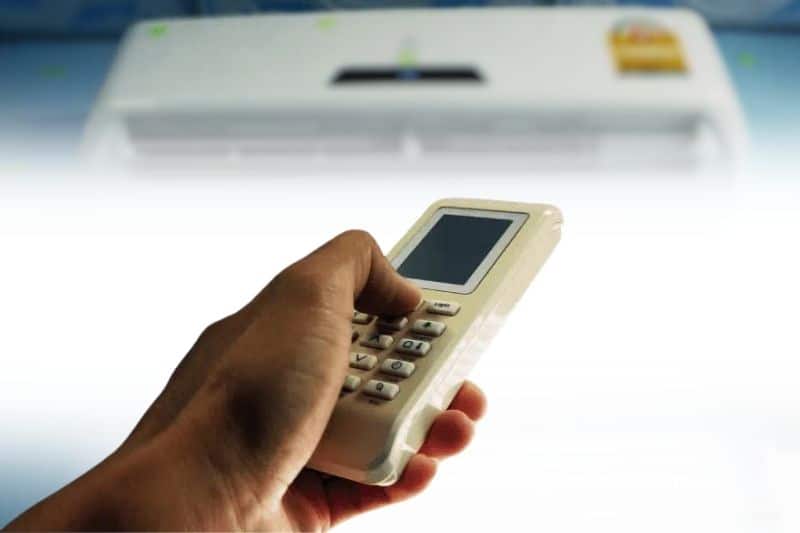Summer is just around the corner and it is one of the best seasons to be in. With the weather being so warm, it’s no wonder that most people look forward to this time of year. However, the summer heat is also a major concern for those who live in tropical countries like the Philippines. If you live in an area with high temperatures and humidity, this season can be a bit of a drag —especially when you’re stuck inside with no air conditioning unit!
Air conditioner units are being put to test during summer and the demand for cool air increases, which can put a strain on air conditioning performance. This may yield more energy consumption and the possibility of further damage to your ac units.
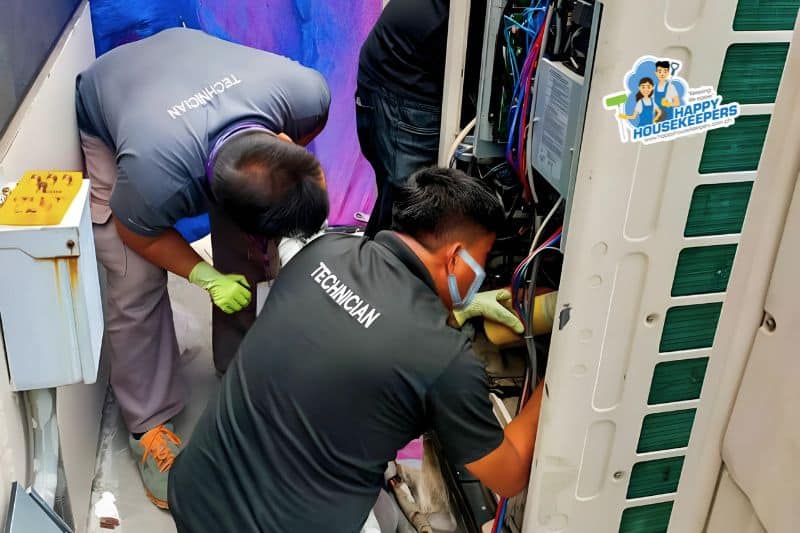
Air conditioning units are a lifesaver during the hot and humid months, providing cool and comfortable indoor environments for people to live and work in. But have you ever wondered how air conditioning units work during summer?
Air conditioning system works by removing hot air from a room and replacing it with cold air. They do this using a refrigeration cycle that involves four main components: a compressor, a condenser unit, an expansion valve, and an evaporator.
The compressor is the heart of the air conditioner unit, compressing the refrigerant gas and increasing its temperature. The hot gas then flows to the condenser, where it is cooled down and condensed into a liquid. The liquid refrigerant then flows through the expansion valve, where it is released into a lower-pressure area, causing it to evaporate and absorb heat from the surrounding air.
The evaporator is where the magic happens. As the liquid refrigerant evaporates, it absorbs heat from the surrounding air, which is then blown into the room by the aircon unit’s fan, creating cool air. The refrigerant then flows back to the compressor, where the cycle starts all over again.
During summer, aircon units have to work harder to keep us cool. As the outside temperature rises, so does the temperature inside our homes and businesses, and getting in the way of air conditioning efficiency. Aircon units have to work harder to remove the warm air and replace it with cool air, resulting in higher energy consumption and potentially higher utility bills.
In addition to cooling the air, aircon units also remove excess moisture from the air, which can make it feel even more uncomfortable during the hot months. This process is called dehumidification, and it occurs as warm, moist air passes over the evaporator coils. The cold coils cause the moisture in the air to condense into water droplets, which are then drained away from the unit.
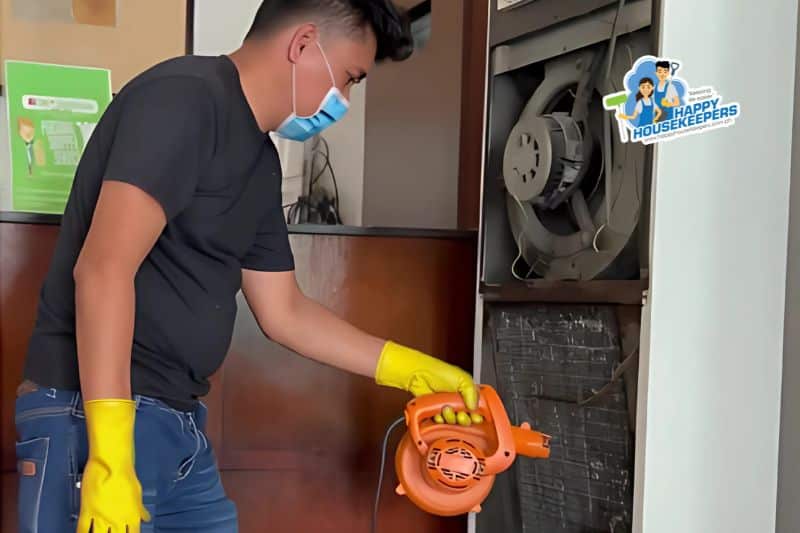
Reasons Why Summer Can Increase the Possibility of Air Conditioner Failure
1. Increased Usage
As temperatures rise, people tend to use their air conditioning units more frequently and for longer periods of time. This increased use can put a strain on air conditioning system, causing them to work harder than usual and increasing the likelihood of breakdowns and failures.
2. Clogged Filters
During the summer months, air conditioner filters can become clogged with dirt, dust, and other debris. This can reduce airflow and make the system work harder than it needs to, increasing the possibility of a breakdown.
3. Refrigerant Leaks
Summer temperatures can cause refrigerant lines to expand and contract, which can lead to leaks. Refrigerant leaks can cause the air conditioning system to malfunction, leading to reduced cooling capacity and even system failure.
4. Electrical Problems
High temperatures can also cause electrical components in aircon systems to overheat, which can lead to failure. This can be particularly problematic in older systems or those that have not been properly maintained.
5. Lack of Maintenance
Neglecting air conditioning unit maintenance during the summer months can increase the likelihood of system failure. Regular maintenance, such as cleaning coil and air filters, checking refrigerant levels, and inspecting electrical components, can help prevent breakdowns and extend the life of your system.
Despite the possible risks these hot months may bear, there are ways on maintaining your air conditioner units so that they operate perfectly throughout the summer season. Accompany us more in this blog and we’ll explore some simple steps that will help keep your air conditioning units working well during the hot months.
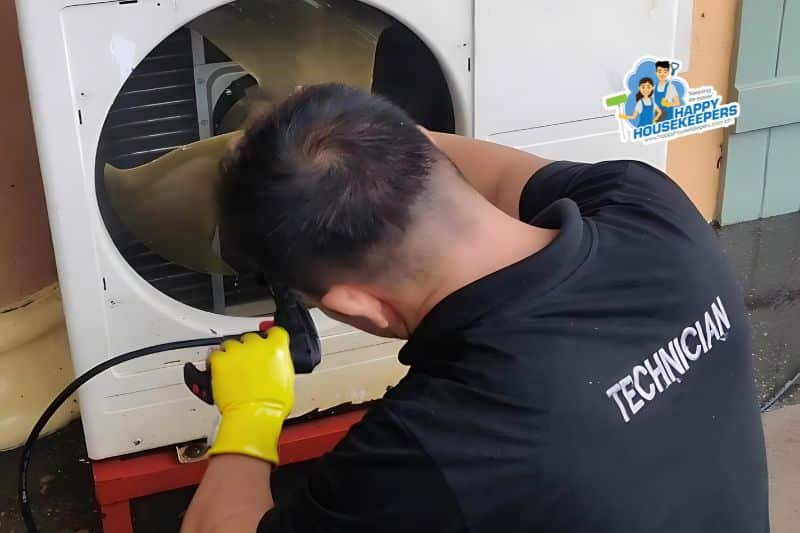
How Do I Take Care of My Air Conditioner during Summer?
1. Clean the Filters of Your Air Conditioner
Keeping your AC unit clean is one of the most important things you can do to keep it running properly. The following are some ideas for keeping your unit as clean as possible:
The air filters in your aircon unit play a crucial role in keeping the air clean and flowing smoothly. Over time, these filters can become clogged with dust and debris, which can restrict airflow and reduce the efficiency of your unit. To maintain your air conditioners, it is important to clean or replace your dirty filters regularly, ideally once a month or as needed.
You may be wondering how often to change your filters. Changing them depends on the type of filter you have, but as a general rule of thumb, you should replace them every six months or so. If you’re unsure if your air conditioner has a filter in place, it’s likely there is one on the backside of your unit. This can be removed with an Allen wrench or similar tool that comes with most AC units when they are purchased new.
Once removed from its housing and cleaned off thoroughly with soap and water (or another mild detergent), dry off any excess liquid before putting it back into place again inside your unit’s cabinet area where it will stay protected from dust accumulation until needed again later down the road when replacement time arrives again soon enough!
We recommend using MERV 8 rated filters which offer great protection against airborne particles such as pollen grains found within indoor environments during summer months when doors/windows tend open more often due to warmer weather conditions outside – making these highly effective at keeping allergens out while still maintaining airflow levels inside homes/offices etcetera which helps keep cool temperatures consistent throughout hot days without having too much humidity build up around windowsills etcetera causing mold growth problems later down line when humidity levels rise above 45% percent humidity content level threshold level.
2.Check and Clean Coils
One of the most important things you can do to ensure your AC unit stays in top shape is to clean the coils. The evaporator and condenser coils in your air conditioner unit can also collect dirt and debris over time, which can restrict airflow and reduce the efficiency of your unit. It is important to check these coils and clean them as needed to maintain proper airflow and ensure that your unit is working efficiently. The coils are what draw heat out of your home, so they need to be clean and free from debris so they can do their job.
Clean out any dirt on coils inside of condenser (the big white box-like part). Dirt can build up here over time and cause problems with efficiency due to increased friction from contact between metal surfaces when they’re dirty; therefore, regular cleaning will help prolong lifespan by reducing wear-and-tear on parts like bearings that would otherwise see frequent use without proper lubrication between moving parts due to friction caused by grime buildup over time if left unchecked.
Clean them at least once every year or two depending on how often you use your system and where it’s located (if it’s closer to trees or bushes, they may collect more dust). You’ll know when it’s time: as dirt builds up on them, they won’t be able to keep as much cool air inside your house without working harder–and that means higher electricity bills!
3. Check for Leaks and Refrigerant Levels
If you find a leak, call a professional. You can check your system for leaks by using a leak detection liquid or water. If you choose to do it yourself, here’s how:
- Pour the liquid onto all of the hose connections and around any other areas where there are hoses or pipes connected to your air conditioning unit.
- Leave it alone for at least 30 minutes so that it can settle into any hidden cracks or holes in the system (if there are any).
- Check back on each area after 30 minutes with a flashlight and look for anything that looks different than before–it may be slightly discolored or wetter than other areas where no liquid was poured over them during this time period
Your air conditioner refrigerant is what cools the air that is circulated through your home. Low refrigerant levels can reduce the efficiency of your unit and cause it to work harder than necessary, leading to breakdowns and failures. It is important to have your refrigerant levels checked regularly to ensure that they are at the appropriate levels.
4. Keep the Area Around the Condenser Unit Clean and Clear
The area surrounding your air conditioner can also impact its efficiency. It is important to keep the area around your unit clean and clear of debris to allow for proper airflow and prevent damage to the unit. Remove any debris that collects around it, such as leaves or dirt. These things can block airflow into the system and cause damage, so removing them regularly is important for keeping things running smoothly.
It’s important to keep the area around your air conditioning unit clean and dry. Dirt, debris, and moisture can get into the system and cause problems. If you have a swimming pool or spa nearby and it rains frequently, place something over your unit to protect it from raindrops that could damage it or clog its vents.
If you have kids or pets in the house (or if they visit), make sure they don’t play with any parts of the AC unit–and never let them crawl inside! You should also keep loose items out of reach as well–you don’t want anything blocking airflow or falling onto hot components inside the machine itself.
5. Schedule Regular Maintenance
Regular maintenance by a professional can go a long way in maintaining the efficiency and longevity of your air conditioners. While many homeowners or business owners may feel tempted to take on maintenance themselves, scheduling regular air conditioner maintenance with experts or professionals is the best way to ensure its longevity and efficiency.
A professional can perform a thorough cleaning, inspect all components, and address any issues before they become bigger problems. Professional aircon technicians have the training, experience, and tools necessary to diagnose and repair any issues with your unit. They can perform a thorough inspection and cleaning of your aircon unit, checking for any leaks, loose connections, or worn components. Regular maintenance can prevent more significant problems from developing, ensuring your aircon unit runs efficiently for years to come.
Moreover, scheduling regular maintenance with professionals can also save you money in the long run. An efficient air conditioner uses less energy, resulting in lower utility bills. Regular maintenance also helps to identify any issues early on, preventing costly repairs down the road.
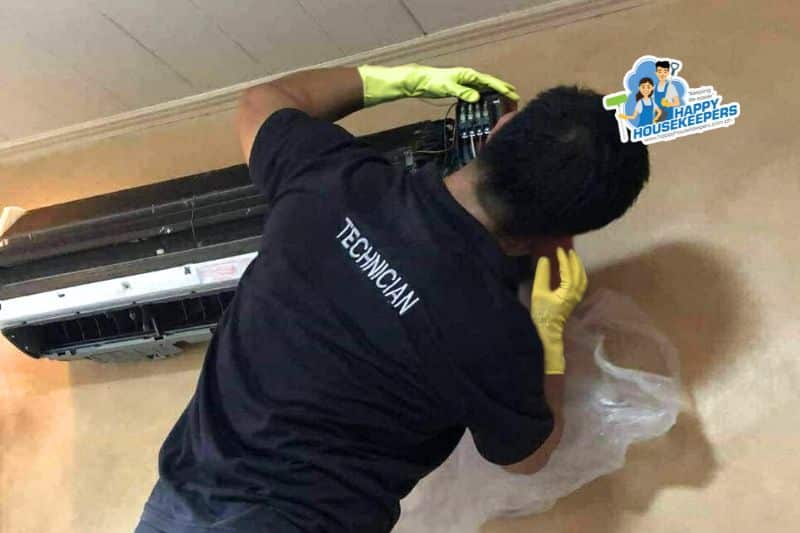
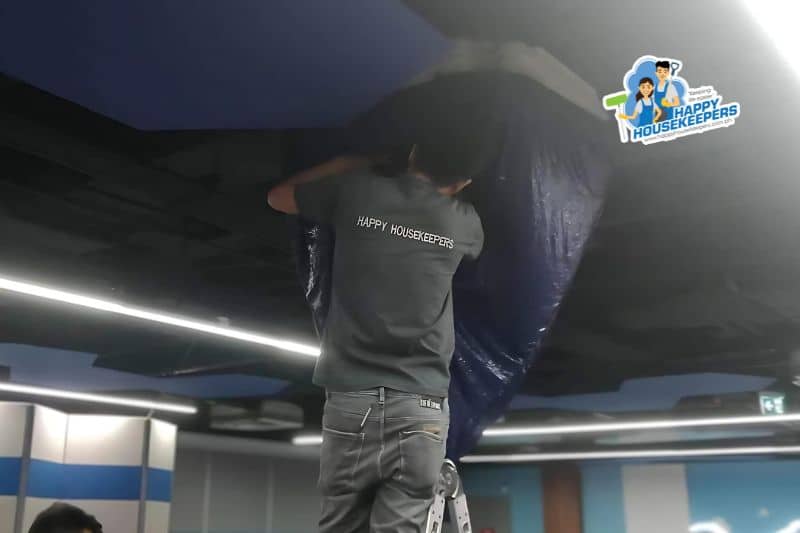
If you still don’t have trusted professional technicians for this kind of service, you may contact us at info@happyhousekeepers.com.ph. The hot summer months are just around the corner, and you need to make sure that your air conditioning system is ready to keep up with the heat.
We offer comprehensive air conditioning services, including cleaning, maintenance, repair, and installation. We understand how important it is to have a reliable air conditioning system, especially during the hot summer months. That’s why we’re here to provide top-notch services to ensure your system is running smoothly and efficiently.
Happy Housekeepers have built our reputation on providing excellent customer service and high-quality workmanship. We have all of the equipment necessary to clean and maintain all types of air conditioning systems, including ductless split systems, central air units, evaporative coolers, heat pumps, refrigeration units and more!

